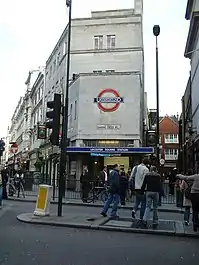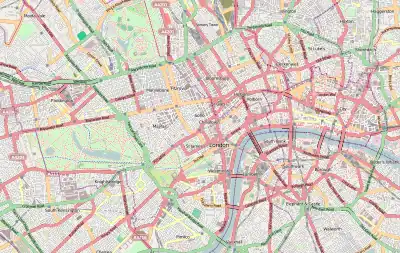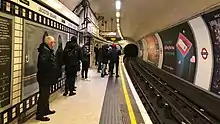Leicester Square tube station
Leicester Square is a London Underground station in the West End of London, within walking distance of Theatreland and Chinatown. It is located on Charing Cross Road, a short distance to the east of Leicester Square itself.
| Leicester Square | |
|---|---|
 | |
 Leicester Square Location of Leicester Square in Central London | |
| Location | Theatreland and Chinatown |
| Local authority | City of Westminster |
| Managed by | London Underground |
| Number of platforms | 4 |
| Fare zone | 1 |
| London Underground annual entry and exit | |
| 2018 | |
| 2019 | |
| 2020 | |
| 2021 | |
| 2022 | |
| Railway companies | |
| Original company | Great Northern, Piccadilly and Brompton Railway Charing Cross, Euston and Hampstead Railway |
| Key dates | |
| 15 December 1906 | GNP&B station opened |
| 22 June 1907 | CCE&H station opened |
| Other information | |
| External links | |
| WGS84 | 51.51139°N 0.12806°W |
The station is on the Charing Cross branch of the Northern line between Tottenham Court Road and Charing Cross stations, and on the Piccadilly line, between Piccadilly Circus and Covent Garden stations. It is in Travelcard Zone 1.
History
On early Tube plans, the station was listed as Cranbourn Street, but the present name was used by the Great Northern, Piccadilly and Brompton Railway when the station opened on 15 December 1906.[6]
Like other stations on the original sections of the Piccadilly and Northern lines, the station was originally constructed with lifts providing access to the platforms. The increase in passenger numbers in the 1920s as the Northern line was extended north (to Edgware) and south (to Morden) and the expected further increase from the 1930s extensions of the Piccadilly line led to the reconstruction of the station below ground in the early 1930s. New station entrances were constructed to a new sub-surface ticket hall. As with the similar sub-surface ticket hall previously built at Piccadilly Circus, this was excavated partially under the roadway. From there banks of escalators were provided down to both sets of platforms. The redundant lifts were removed but the lift shaft remains in use as a ventilation shaft hidden behind a small door on the first landing of the Cranbourn Street entrance stairs. The redeveloped station opened in 1935.[7]
The escalators down to the Piccadilly line (the longest in the world when opened in 1935) [8] were the longest on the entire Underground network, being 54 m (177 ft) in length, until the rebuilding and reopening of Angel in 1992, which overtook Leicester Square with its 60 m (197 ft) escalators.[9]
Offices above the red terracotta station building on the east side of Charing Cross Road were once occupied by the Northern line management staff but now have other functions in addition to the Northern line management, with Piccadilly line management and support functions on the first floor including a training centre. The building, known as Transad House, was occupied in its early years by the publishers of the Wisden Cricketers' Almanack and an image of cricket stumps appears above a doorway.

On all four platforms, film sprockets are painted down the entire length and on the top and bottom of the display area (blue on the Piccadilly line platforms, and black on the Northern line platforms), in reference to the four premiere cinemas in Leicester Square.
Connections
London Buses routes 24, 29, 176 and night routes N5, N20, N29, N41 and N279 serve the station.[10][11]
See also
- Leslie Green – architect of original station building
- Charles Holden – (1875–1960) architect of new ticket hall and entrances
References
- "Station Usage Data" (CSV). Usage Statistics for London Stations, 2018. Transport for London. 23 September 2020. Archived from the original on 14 January 2023. Retrieved 11 October 2023.
- "Station Usage Data" (XLSX). Usage Statistics for London Stations, 2019. Transport for London. 23 September 2020. Archived from the original on 9 November 2020. Retrieved 9 November 2020.
- "Station Usage Data" (XLSX). Usage Statistics for London Stations, 2020. Transport for London. 16 April 2021. Retrieved 1 January 2022.
- "Station Usage Data" (XLSX). Usage Statistics for London Stations, 2021. Transport for London. 12 July 2022. Retrieved 7 September 2022.
- "Station Usage Data" (XLSX). Usage Statistics for London Stations, 2022. Transport for London. 4 October 2023. Retrieved 10 October 2023.
- Follenfant, H. G. (1975). Reconstructing London's underground. London Transport Executive. p. 45. ISBN 9780853290391.
- "Underground Journeys: Leicester Square". Royal Institute of British Architects. Archived from the original on 7 July 2011.
- Lee, Charles (1973). The Piccadilly Line. London: London Regional Transport. p. 23. ISBN 0853290423.
- "Underground Journeys: Escalators". Royal Institute of British Architects. Archived from the original on 7 July 2011.
- "Buses from Leicester Square" (PDF). TfL. June 2022. Retrieved 1 August 2022.
- "Night buses from Leicester Square" (PDF). TfL. June 2022. Retrieved 1 August 2022.
External links
- London Transport Museum Photographic Archive
- Leicester Square station before building above was constructed, 1907
- Leicester Square station, 1925
- Original ticket hall in 1927
- New entrance on the south side of Cranbourne Street, 1935
- New sub-surface ticket hall after opening in 1935
- New entrance on the corner of Little Newport Street (now disused), 1955
- "Underground Journeys, Charles Holden's work for London Underground". Royal Institute of British Architects. Archived from the original on 7 July 2011.
- "Underground Journeys: Leicester Square, Design drawing and history". Royal Institute of British Architects. Archived from the original on 7 July 2011.
- "Underground Journeys: Escalators". Royal Institute of British Architects. Archived from the original on 7 July 2011.
| Preceding station | Following station | |||
|---|---|---|---|---|
| Piccadilly Circus | Piccadilly line | Covent Garden towards Cockfosters or Arnos Grove | ||
| Tottenham Court Road | Northern line Charing Cross Branch |
Charing Cross | ||